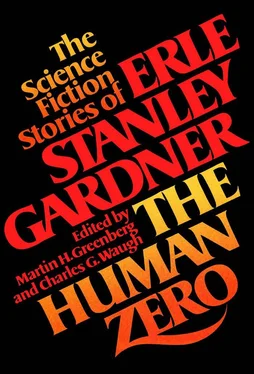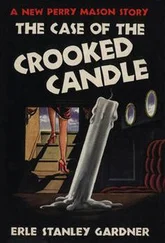“Look around, you guys, for another exit from this laboratory. And keep those electric fans going. I don’t trust this bird. He’s likely to flood a lot of poison gas through that ventilating system of his... I’m commencing to get so I can see a little bit. Be all right in a few minutes, I hope.”
The men scattered, examining the wainscoting.
“Here we are, captain!” called one of the men. “Take a look at this. Something here, right enough, but I can’t just figure how it works... Wait a minute. That’s it!”
Something clicked as the officer stepped back. A section of the wainscoting swung open, revealing a passage the height of a man crawling on all fours.
“Volunteers,” said Captain Harder. “Damn these eyes! I’m going myself.”
And he approached the passageway.
There was a stabbing burst of flame, the rattle of a machine gun, and a withering hail of bullets vomited from out of the passageway.
Captain Harder staggered backward, his right arm dangling at his side. The man who had been next to him dropped to the floor, and it needed no second glance to tell that the man was dead, even before he hit the floor.
The walls of the laboratory echoed to the crash of gunfire. Policemen, flinging themselves upon the floor, fired into the yawning darkness of that oblong hole in the wall. Here and there, riot guns belched their buckshot into the passageway.
There was the sound of the mocking laughter, another spurt of machine gun fire, then silence.
Captain Harder had his coat off, was groping with his left hand for the location of the two bullet holes in his right arm and shoulder.
“Reckon I’m going to be an ambulance case, boys. Don’t risk anything in there. Try gas.”
The captain turned, groped for the door, staggered, fell. Blood spurted from the upper wound, which had evidently severed an artery.
Men grabbed him, carried him to the head of the stairs where ambulance men met them with a stretcher. Officers continued to keep up a fire upon the passageway. A man brought in a basket containing hand grenades and tear gas bombs. The pin was pulled from a tear gas bomb. The hissing of the escaping gas sounded plainly while the men on the floor held their fire.
The man who carried the gas bomb ran along the side of the wainscoting, flung the bomb into the opening. It hit with a thud, rolled over and over.
There was no sound emanating from the passageway, save the faint hiss of the gas.
“Give him a dose of it and see how he likes it,” said one of the men.
As though to answer his question, from the very vicinity of the tear gas bomb, came a glittering succession of ruddy flashes, the rattle of a machine gun.
One of the men who was on the floor gave a convulsive leap, then quivered and was still. A hail of bullets splintered through the glass equipment which had been broken and scattered about. An officer tried to roll out of the way. The stream of bullets overtook him. He jumped, twitched, shivered, and the deadly stream passed on.
Sid Rodney grasped a hand grenade from the basket, pulled the pin, jumped to his feet.
The machine gun whirled in his direction.
“He’s got a gas mask!” yelled one of the men who was crouched behind the shelter of an overturned bench.
Sid Rodney threw the grenade with all of the hurtling force of a professional baseball pitcher.
The missile hit squarely in the center of the opening, thudded against something that emitted a yell of pain.
The machine gun became silent, then stuttered into another burst of firing.
A livid sheet of orange flame seared its way out into the room. The whole side of the place seemed to lift, then settle. A deafening report ripped out the glass of windows in one side of the house. Plaster dust sprayed the air.
The oblong hole from which the machine gun had been coughing its message of death vanished into a tumbled mass of wreckage.
Men coughed from the acrid powder fumes, the irritating plaster dust.
“Believe that got him,” said one of the men, rolling out from the shelter, holding a riot gun at ready as he rushed toward the tumbled mass of wreckage.
A human foot was protruding from between a couple of splintered two-by-fours. About it eddied wisps of smoke.
The officer was joined by others. Hands pulled the rafters and studs to one side. The body of a mangled man came sliding out.
From the blackness of that hole came the orange flicker of ruddy flame, the first faint cracklings of fire.
The mangled body had on what was left of a gas mask. The torso was torn by the force of the explosion parts of a machine gun were buried in the quivering flesh. But the features could be recognized.
Albert Crome, the crack-brained scientist, had gone to his doom.
Men rushed up with fire-fighting apparatus. The flames were swiftly extinguished. The wreckage was cleared away. Men crawled into that little cubicle where the scientist had prepared a place of refuge.
It was a little room, steel-lined, fitted with a desk, a table, and a cot. Also there was a telephone extension in the room, and an electrical transformer, wires from which ran to a boxlike affair, from the interior of which came a peculiar humming sound.
“Leave it alone until the bombing squad gets here. They’ll know if it’s some sort of an infernal machine. In the meantime let’s get out of here.”
The sergeant who gave the orders started pushing the men back.
Even as he spoke, there was a glow of ruddy red light from the interior of the box-like affair into which the electric wires ran.
“Better disconnect those wires,” called one of the men.
The sergeant nodded, stepped forward, located the point of contact, reached to jerk one of the wires loose.
“Look out, don’t short circuit ’em!”
Sid Rodney had crawled back out of the passage. The sergeant was tugging at the wires. They came loose, touched. There was a flash from the interior of the box-like machine, a humming, and then a burst of flame that died away and left a dense white smoke trailing out in sizzling clouds.
“You’ve short circuited the thing. That other wire must have been a ground and a button...”
But Sid Rodney was not listening.
His eyes happened to have been upon the cage of white rats as the voice called its warning. Those rats were scampering about the cage in the hysteria of panic.
Abruptly they ceased all motion, stood for a split fraction of a second as though they had been cast in porcelain. Then they shrank upon themselves.
Sid Rodney screamed a warning.
Men looked at him, followed the direction of his pointing forefingers, and saw an empty cage.
“What is it?” asked a detective.
Sid Rodney’s face was white, the eyes bulging.
“The rats!”
“They got away. Somebody turned ’em loose, or the explosion knocked the cage around or blew a door open,” said the officer. “Don’t worry about them.”
“No, no. I saw them melt and disappear. They just dissolved into the atmosphere.”
The officer snickered.
“Don’t bother yourself about rats,” he said. “We’ve got work to do. Gotta find out what’s going on here, and we’ve gotta locate Dangerfield.”
He turned away.
Sid Rodney went over to the cage. He grasped the metal wires. They were so cold to his touch that the slight moisture on the tips of his fingers stuck to them.
He jerked one hand, and a bit of skin from the tips of his fingers pulled away.
He noticed a little pan of water which had been in the cage. It was filmed with ice. He touched the wires of the cage again. They were not so cold this time.
The film of ice was dissolving from the pan of water in the cage.
But there were no more white rats. They had disappeared, gone, utterly vanished.
Читать дальше












